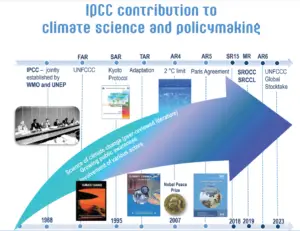
Why in news?
- In recent news, a study scrutinized over 500 future emissions scenarios evaluated by the UN Intergovernmental Panel on Climate Change (IPCC), shedding light on significant inequities within projected climate action pathways.
- To grasp the essence of this issue, let’s delve into the IPCC reports and explore the crucial role equity plays in climate change mitigation.
About IPCC Reports
- The IPCC regularly releases comprehensive assessment reports synthesizing scientific literature on climate change.
- These reports, including physical science assessments, adaptation, mitigation actions, and synthesis reports, serve as vital resources for policymakers worldwide.
- They provide a scientific basis for governments to develop climate-related policies and underlie negotiations at the UN Climate Conference.
Assessment of Future Scenarios:
- Using Integrated Assessment Models (IAMs), the IPCC estimates modelled pathways to limit Earth’s surface warming.
- However, these models have shortcomings, often prioritizing least-cost assessments without considering historical responsibilities or economic disparities.
- For example, absolute costs of implementing renewable energy projects vary significantly between developed and developing countries, leading to unequal burdens in climate action.
Findings of the New Study:
- Analysis of IPCC scenarios reveals troubling projections, indicating that developing nations will bear a heavier burden in terms of carbon sequestration and mitigation technologies.
- This inequitable distribution places undue responsibility on poorer countries, exacerbating existing disparities in development.
- Moreover, projections suggest that regions with the highest population densities, such as Sub-Saharan Africa and parts of Asia, will continue to lag behind in economic growth, further widening the gap between the Global North and South.
Importance of Equity in Tackling Climate Change:
- Recognizing historical responsibility is crucial in addressing climate change fairly, considering that wealthier nations have historically contributed more to greenhouse gas emissions.
- equity ensures vulnerable communities receive necessary support to adapt to climate impacts and have access to resources for mitigation efforts.
- Without equitable distribution of resources and responsibilities, climate change mitigation efforts risk exacerbating social inequalities and injustices.
Global Cooperation and IPCC’s Role
- The IPCC plays a pivotal role in providing policymakers with scientific assessments to develop climate-related policies.
- achieving meaningful progress requires global cooperation and solidarity, guided by principles of equity and common but differentiated responsibilities.
- By fostering cooperation among nations and acknowledging the varying capacities and responsibilities in addressing climate change, equitable solutions can be developed that benefit all parties involved.
Conclusion:
- Analyzing IPCC scenarios underscores the urgent need to prioritize equity in climate action.
- As we navigate the complexities of climate change mitigation, it’s imperative to recalibrate strategies, acknowledging historical responsibilities and ensuring fair distribution of burdens and benefits across nations.
- Through concerted efforts guided by principles of equity and cooperation, we can foster a more just and sustainable future for all in the face of climate change.
People also ask
Q1: What prompted the recent focus on equity in climate change mitigation?
Ans: A recent study analyzed over 500 future emissions scenarios evaluated by the IPCC, revealing significant inequities within projected climate action pathways. This has sparked discussions on the importance of equity in addressing climate change.
Q2: What are IPCC Assessment Reports, and how do they relate to equity in climate change mitigation?
Ans: IPCC Assessment Reports provide comprehensive scientific assessments of climate change, including projections of future scenarios. The recent study highlighted disparities in these scenarios, emphasizing the need for equity considerations in mitigation efforts.
Q3: What role do Integrated Assessment Models (IAMs) play in estimating future climate scenarios?
Ans: IAMs are used by the IPCC to model pathways for limiting Earth’s surface warming. However, these models often prioritize least-cost assessments, leading to inequitable distribution of responsibilities and burdens in climate action.
Q4: What were the key findings of the study analyzing IPCC scenarios?
Ans: The study found that developing nations are projected to bear a heavier burden in terms of carbon sequestration and mitigation technologies. Additionally, regions with high population densities are expected to lag behind in economic growth, exacerbating disparities between developed and developing countries.
Thanks for sharing. I read many of your blog posts, cool, your blog is very good.
I don’t think the title of your article matches the content lol. Just kidding, mainly because I had some doubts after reading the article.